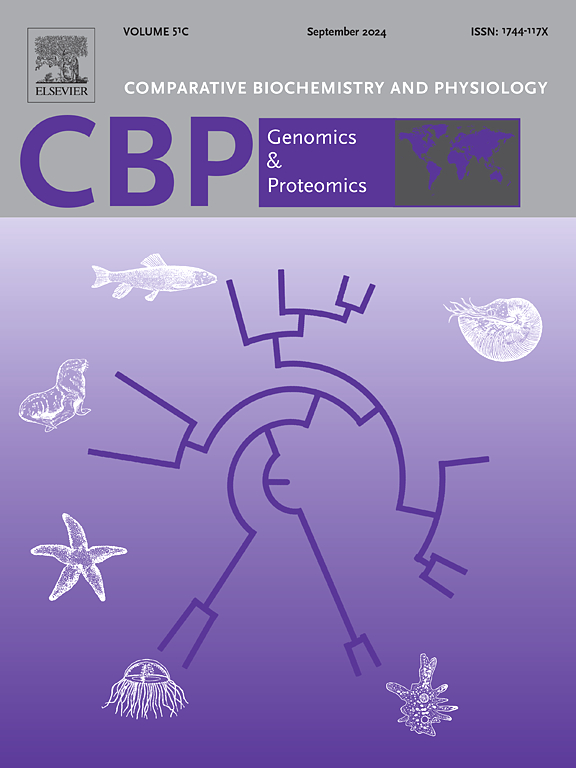The molecular response of Neoseiulus bicaudus to cold acclimation
IF 2.2
2区 生物学
Q4 BIOCHEMISTRY & MOLECULAR BIOLOGY
Comparative Biochemistry and Physiology D-Genomics & Proteomics
Pub Date : 2025-06-12
DOI:10.1016/j.cbd.2025.101565
引用次数: 0
Abstract
Neoseiulus bicaudus is a beneficial predatory mite used for the control of spider mites. Temperature is a crucial factor that influences the distribution, growth, and development of N. bicaudus. Cold acclimation is an important arthropod strategy used to improve cold tolerance. We investigated the impact of cold acclimation on the cold tolerance of N. bicaudus. To gain insights into the molecular mechanisms underlying cold acclimation of N. bicaudus, we conducted transcriptome and proteomic analyses on three cold-acclimated groups (6-h: 3 °C for 6 h; 24-h: 3 °C for 24 h; 7-day: 9 °C for 7 d). Cold acclimation, especially in the 7-day treatment, significantly improved the survival time of N. bicaudus at an acute low temperature (−6 °C). Multi-omics analysis revealed that cold acclimation in N. bicaudus involves coordinated regulation of genes and proteins related to energy metabolism and cellular protection. Cold acclimation suppressed energy-intensive pathways like fatty acid synthesis and glycolysis, reducing energy expenditure. However, it enhanced expression of proteins in fatty acid oxidation, tricarboxylic acid cycle, and oxidative phosphorylation pathways to maintain energy balance. Moreover, cold acclimation upregulated genes and proteins involved in mRNA processing, transport, translation regulation, protein folding, and degradation, ensuring rapid repair and synthesis of proteins for homeostasis. RNA interference of NbHSP70 and NbHSP90 showed that these genes play a vital role in regulating the cold tolerance of N. bicaudus. These findings provide valuable resources and opportunities to uncover molecular acclimation mechanisms that support cold tolerance in Phytoseiid mites.

双头新绥螨对冷驯化的分子响应
bicaudus新绥螨是一种有益的捕食性螨,用于防治蜘蛛螨。温度是影响双头石竹分布、生长发育的重要因素。冷驯化是节肢动物提高耐寒性的重要策略。研究了冷驯化对双头石竹耐寒性的影响。为了深入了解双头野鸡冷驯化的分子机制,我们对三个冷驯化组(6小时:3°C, 6小时;24小时:3℃24h;7天:9°C 7 d)。冷驯化,特别是在7 d的低温处理下,显著提高了双头海棠在急性低温(- 6℃)下的存活时间。多组学分析表明,双头海棠的冷驯化涉及与能量代谢和细胞保护相关的基因和蛋白质的协调调节。冷驯化抑制了脂肪酸合成和糖酵解等能量密集型途径,减少了能量消耗。然而,它可以增强脂肪酸氧化、三羧酸循环和氧化磷酸化途径的蛋白表达,以维持能量平衡。此外,冷驯化上调了参与mRNA加工、转运、翻译调控、蛋白质折叠和降解的基因和蛋白质,确保了体内平衡所需蛋白质的快速修复和合成。NbHSP70和NbHSP90的RNA干扰表明,这两个基因在调控双头海参的耐寒性中起着至关重要的作用。这些发现为揭示支持植物螨耐冷性的分子驯化机制提供了宝贵的资源和机会。
本文章由计算机程序翻译,如有差异,请以英文原文为准。
求助全文
约1分钟内获得全文
求助全文
来源期刊
CiteScore
5.10
自引率
3.30%
发文量
69
审稿时长
33 days
期刊介绍:
Comparative Biochemistry & Physiology (CBP) publishes papers in comparative, environmental and evolutionary physiology.
Part D: Genomics and Proteomics (CBPD), focuses on “omics” approaches to physiology, including comparative and functional genomics, metagenomics, transcriptomics, proteomics, metabolomics, and lipidomics. Most studies employ “omics” and/or system biology to test specific hypotheses about molecular and biochemical mechanisms underlying physiological responses to the environment. We encourage papers that address fundamental questions in comparative physiology and biochemistry rather than studies with a focus that is purely technical, methodological or descriptive in nature.

 求助内容:
求助内容: 应助结果提醒方式:
应助结果提醒方式:


